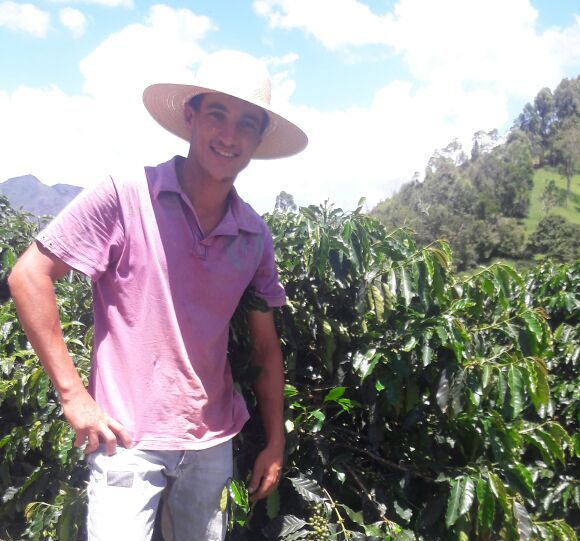Very small property with only 8 hectares of coffee and another 9 hectares of area, a dedicated family and lots of work to do in a daily basis. This would be a regular scenario for family farming, but the difference in this particular case is that the next generation in coffee is guaranteed. At Arruda’s family, for example, the different generations have chosen to stay at the small farm to improve coffee production. “My grandpa Hilton Arruda, who is 78 years old today, started by himself this coffee plantation. Now, each son takes care of one part of the crop”, explains Cristiano Arruda.
Cristiano is 28 years old and nowadays he is in charge to manage and to connect the production that other family members are working with. His parents, Mr. Ahirton Arruda and Hotildes Klem Arruda (both at the age of 54 years old) are important part of the production since no outsiders work on the property. “Everything is touched only by our family. Even my younger brother Marcleiton Arruda, who regularly works at the city, and during his vacations help us during harvest”, says Cristiano.
The harvest – an average of 220 bags of 60kg are collected per year – is manual. All the coffee is dried on concrete patio, where the patriarch Mr. Hilton works to assure the beans will dry properly. The Catuaís and Catucaís plants are cultivated with 1150 meters high and the processing method adopted by the family is Naturals.
After conquering the 5th place at Bourbon’s quality contest and great position at EMATER’s contests, their attention started focusing only to specialty coffee. “Now, we are searching for new production and post-harvest techniques towards quality”, concludes Cristiano. New drying methods and knowledge about new varietals are also under his radar.
Located in Luisburgo, a small town of Minas Gerais state, three hours’ drive from Viçosa, it has only 145 km² of extension and 6 thousand inhabitants. Its mountainous area can register low altitudes that start with 500 meters to the highest point, the Peak of Pedra Dourada with 1.810 meters. The economy of the city is based on livestock and coffee production, with an impressive number of 16 million coffee plants.
What you should know about Luisburgo city:
This rural and ecologic paradise was formed by its natural beauties and crowned by mountains and coffee farms. The soil fertility also formed the Natural Park around Pedra Dourada and the main preservation area of Mata Atlântica at Luisburgo. With borders with Serra do Caparaó, the city has great potential for Agro and Ecotourism.
The region where Luisburgo is located today started being colonized in the decade of XIX. Before that, Tupi Indians were the local habitants who were “civilized” or decimated by colonizers and immigrants from Espírito Santo shore and Rio de Janeiro state.
Mr. Domingo Fernandes Lana was responsible for opening the first roads in the area to enable transportation, and after that several Swiss families (Hott, Baltazar,Cosendey, Giviziez) started cultivating in their properties. New European families – German, Swiss, Portuguese, and Italian – arrived alongside with Turkish and Lebanese immigrants between the years of 1860 and 1874.
“We love to do what we do. For this reason, we make with passion.” – Cristiano Arruda

